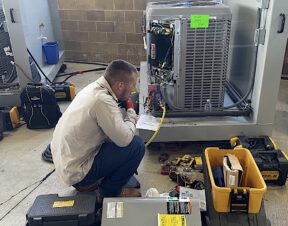The global pandemic has affected almost every facet of society, industry, and government. The past 12 months have had a dramatic impact on the way in which we live, interact and work, with face masks being just a minor inconvenience over some more pressing issues.

Work from home orders while under lockdown meant that many people were able to adapt to a changing world, but this is only feasible for those with jobs that require minimal interaction such as office workers, and restrictions meant that engaging jobs such as those performed by contractors, catering and other services either had to completely change or stop altogether with Covid affecting other areas of industry as well.
Health and Safety
Health and safety at work is always a primary concern of any good business owner or manager and extends to all members of staff. The unpredictable nature of Covid-19 and its transmission rates means that it just wasn’t worth taking the risk. Face masks, the 2-meter rule, and social distancing are all well and good, but Covid safety extends beyond these.
During the pandemic and indeed moving forward, you should be looking for ways to maintain a Covid-safe working environment by actively enforcing policies in order to minimize risk. This means that health measures need to be in place. Carlos Ramirez Safety advises that such things as temperature checks be implemented before anyone enters your workspace.
However, there is no “one size fits all” approach when combating Covid and temperature checks should form part of an extended safety procedure being used in conjunction with other measures such as social distancing, minimal contact, and regular sanitization; especially if somebody has touched a surface or used something.
Emerging Technologies
Most industries are quick to embrace new technologies since innovation actually drives the industry forward. Usually, new tech aims to streamline an existing model, increase efficiency and productivity or even replace an older method, all with the aim of either making something safer, increasing profit, or assisting with difficult tasks.
The effect of Covid-19 forced companies to embrace technologies in ways that they did not before. One of the best examples is that of video conferencing. While video conferencing isn’t new, it wasn’t widely used before the pandemic. A recent survey found that 31% of regular business travelers cited video calls as the reason for a major decrease in travel.
Other remote technologies that have found new or increased applications including AR, VR, and drones. The remote nature of all of these technologies allows parties to communicate or interact in ways that keep them completely Covid-safe. VR videos, for example, can be recorded so that an inspector doesn’t need to physically visit a real estate project.
Economic Impact
Sadly though, the hardest-hit area of the entire pandemic is undoubtedly world economies. While provisions could be made for people working from home, it isn’t possible for everyone, and many industries and businesses suffered. Restaurants, bars, and construction projects have had to endure significant losses and while governments helped a little, it wasn’t enough.
In the UK alone, the construction industry suffered significant job losses, with over 83,000 construction workers losing their jobs, the worst figures since 2010. The United States saw horrifying numbers of lost business as well. By July 2020, more than 16,000 restaurants had permanently closed, leaving 15 million industry employees jobless.
Currently, with mass vaccination underway and some nations beginning to ease lockdown restrictions, economies might slowly begin to re-emerge. The UK has recently allowed travel to specific vacation destinations such as Portugal as it looks to return to normal over the summer while the United States is also doing the same, with figures slowly increasing.




Join the conversation: